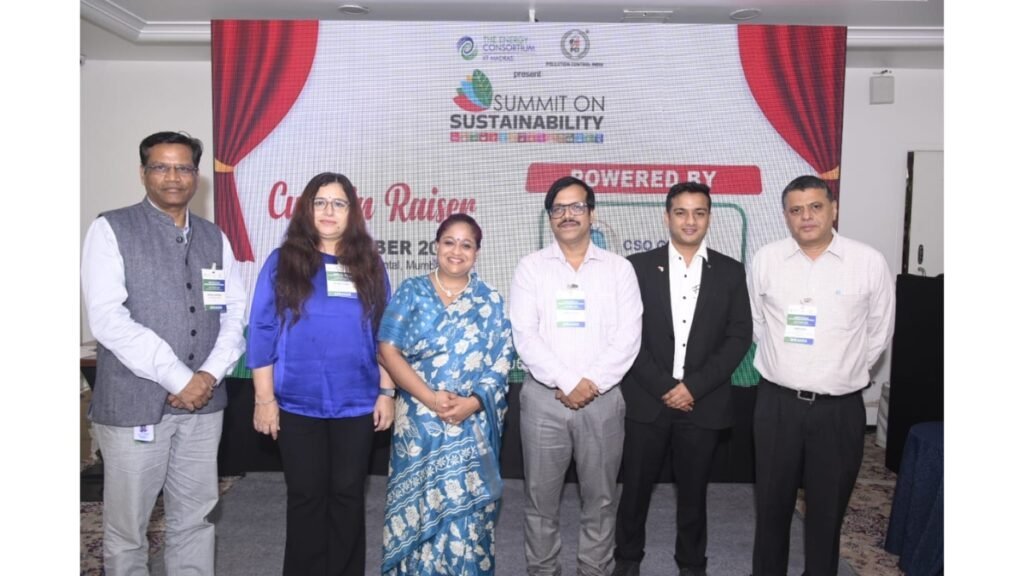Industry Leaders Unite to Drive Sustainability at Summit Curtain Raiser Event
Mumbai (Maharashtra) [India], October 21: In an unprecedented gathering, industry experts from IIT Madras, IGBC Mumbai Chapter, Material Recycling Association of India (MRAI), Indian Pollution Control Association (IPCA), and AND Sustainability came together to advance India’s LiFE (Lifestyle for Environment) Mission and support the United Nations’ 17 Sustainable Development Goals (SDGs). This collaboration aims to foster meaningful change from grassroots to corporate levels, setting a powerful precedent for sustainability leadership.
For decades, sustainability has been the guiding principle of development, ensuring that present needs are met without jeopardizing the future. It calls for living within environmental limits, fostering a healthy, just society, and achieving a stable economy—all underpinned by good governance and social responsibility.
As the world faces mounting challenges—floods in Asia, forest fires in Europe and South America, and devastating hurricanes in the U.S.—the urgent need for corporate growth intertwined with sustainable practices has never been more clear. The Energy Consortium at IIT Madras, in partnership with Pollution Control India, has spearheaded this critical conversation by organizing the Curtain Raiser to the highly anticipated Summit on Sustainability, was held on 18th November 2024 at Hotel Kohinoor Continental, Mumbai.

A Platform for Collaboration
The Curtain Raiser event featured a stellar lineup of eminent speakers and thought leaders, including Dr. Mala Singh, Chairperson, IGBC Mumbai Chapter, Founder & Director, PEC Greening India; Sathvik Batte, Co-Founder, Marichin Sustainables; Biren Vora, Director, Ekaagra Social & Microfinance Foundation; Rushva Parihar, Founder & Sustainability Head, Improving Lives Foundation; Sharang Ambadkar, Founder & CEO, Feel Good EcoNurture LLP; Dr. Nikhil Tambe, CEO, Energy Consortium, IIT Madras; Ganesh Chari, Founder & MD, Neshaju Envirotech; Pramod Shinde, Head of Communications, MRAI; Pravin Lawande, Assistant Manager, IPCA.
These industry leaders, each working toward one or more SDGs, discussed how their collaborative efforts are transforming sustainability from a buzzword into an actionable roadmap. They addressed the media and attendees on the importance of uniting academia, industry, and government in accelerating the adoption of sustainable practices across sectors.
Dr. Nikhil Tambe, CEO, Energy Consortium (IIT Madras) said, “Our goal is to inspire continuous engagement that yields results. The upcoming summit will not just be a one-time event, but a catalyst for a sustained dialogue and innovation for a greener future.”
Dr. Mala Singh, Advisory Board Member at Pollution Control India and Executive Director of CSO Global, highlighted “The significance of green energy and sustainable practices in addressing the pressing challenges of climate change and global warming. She emphasized the need for all stakeholders, including corporates, MSMEs, and individuals, to adopt eco-friendly practices such as energy conservation, waste minimization, and the use of renewable energy sources like solar, wind, and bioenergy. Also, would like to point out the government’s supportive policies, including subsidies for residential and agricultural projects, which are fostering a transition towards cleaner, more sustainable energy solutions. Investing in green energy is not only beneficial for the environment but also offers long-term economic savings for individuals and communities.”
Ganesh Chari, Founder and Deputy of Neshaju Environotypes, emphasized “The importance of integrating ESG (Environmental, Social, and Governance) reporting and compliance, particularly in the wake of escalating climate crises such as flooding and landslides. As industries continue to expand, it’s crucial that we simultaneously prioritize environmental sustainability. By implementing stronger ESG frameworks, we can ensure that future policies are both effective and beneficial to the environment,”
Prof. Anuradda Ganesh, Adjunct Faculty, IIT-Madras School of Sustainability, emphasized “The importance of industry compliance with newly mandated ESG (Environmental, Social, and Governance) reporting standards. “This initiative aims to support industries as they navigate the complexities of ESG reporting, ensuring sustainability practices are deeply integrated. Through collaboration between academia, regulators, and industry, we are addressing key challenges such as emission tracking and resource efficiency. This workshop marks a crucial step toward helping India achieve its net zero targets,”
“This Curtain Raiser is a testament to the power of collaboration between academia and industry to drive sustainable innovation,” said Himakshi Singh, spokesperson for the event. “While many sustainability events take place, the real question is: What lasting impact do they create? Through our Summit on Sustainability, we aim to foster long-term conversations, engagement, and tangible action that move the needle on achieving the SDGs.”
A Glimpse into the Future: Summit on Sustainability
Scheduled for 18th November 2024, the Summit on Sustainability will feature insightful discussions on Corporate Responsibility in Reversing Climate Change, Circular Economy and ESG Compliance, Creating Wealth from Waste with a Focus on EPR, Green Financing and Raising Capital for Sustainable Businesses.
With over 20 high-profile speakers, including Ramveer Tanwar (Pondman of India), Smita Ram (Co-Founder, Rang De Foundation), Prof. Indumathi Nambi (IIT Madras), Nandakumar (CEO, International Center for Clean Water), and Sharang Ambadkar (FeelGood Nurture LLP), the event will bring together 200+ delegates from industries, NGOs, academic institutions, policy makers, and end-users, all committed to forging a path toward a sustainable future.
If you have any objection to this press release content, kindly contact pr.error.rectification@gmail.com to notify us. We will respond and rectify the situation in the next 24 hours.


Comments are closed.